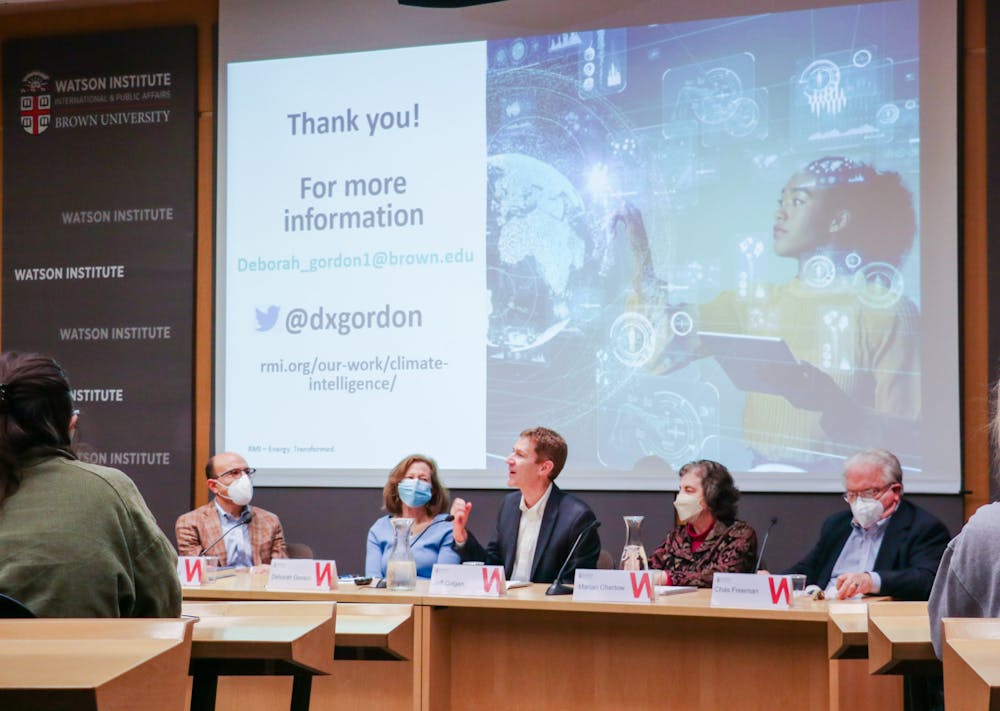At the Watson Institute’s Joukowsky Forum Tuesday evening, panelists discussed “No Standard Oil: Managing Abundant Petroleum in a Warming World,” a book by senior fellow in international and public affairs Deborah Gordon about the oil and gas industries and climate change policies.
At the event, Gordon laid out a path to immediate change, which involves rejecting the simplification of what it will take to save a warming planet. The book was then discussed by a group of panelists, which included Marian Chertow, Professor of Industrial Environmental Management at Yale, Jeff Colgan MA’17, Richard Holbrooke associate professor of political science and international and public affairs and director of the Climate Solutions Lab and Chas Freeman, senior fellow in international and public affairs.
Surrounded by experts and students, Gordon explained the basis of her research. With the support of concrete data and years of analysis, she revealed the falsehoods behind common understandings of the oil and gas industries: the idea that those resources will run out and that oil and gas are standard commodities.
According to Gordon, the reality is more complex. The demand for oil and gas has consistently increased and those commodities actually represent a myriad of components and processes with varied environmental footprints. For Gordon, recognizing those differences is the best way to instigate significant change in the industry.
Gordon started working on the book in 2010, but said the writing process felt like the culmination of her entire career. She mentioned how singular her latest project felt from previous ones in an interview with The Herald.
"It wasn't just a story about what I had learned recently, (but) it really allowed me to go back to the beginning of my career," she said. According to Gordon, she first became aware of the oil crisis at age 15, waiting at gas stations after getting her driver’s license during the 1970s energy crisis. That period was largely responsible for Gordon's decision to become a chemical engineer, she noted. More recently, it inspired her novel approach to cutting back emissions.
While people consider oil and gas to be homogeneous, they have different emissions rates and immensely complex supply-chains, Gordon said. Considering their particular climate impacts at each stage of their life cycle is "a much smarter read at where we can start to nick away to solve the climate crisis," she said. Gordon proposed that, instead of solely focusing on reducing the demand for oil and gas, professionals should turn their attention to the ways they can mitigate climate change more efficiently without placing all the responsibility on consumers. "We will keep trying to get off oil and gas for a lot of reasons, climate and more," but in the meantime, it is already possible to understand where to cut back on emissions, Gordon said.
The group of panelists agreed that the climate crisis needs alternative solutions and Gordon's research has illuminated new avenues for change. By adding complexity to resources considered to be monolithic, Gordon aims to provide industries with new knowledge on ways to become more sustainable without moving away from oil and gas production. Instead of shutting their machines down, companies should compete for the provision of the cleaner oil, instead of forcing them to shut their machines down, she said.
Colgan explained that Gordon's work can not only change the economics behind oil and gas, but also change the politics. A common school of thought concerning climate change involves demanding that the government put the oil and gas industries out of business which, for Colgan, "provides political coverage to an industry that is culpable for wrecking the planet." Gordon proposed that the industry should take a role in the conversation, assuming responsibility for their actions and business choices.
But involving companies does not mean abandoning policies that aim to reduce supply, Colgan said. Both Gordon and Colgan agreed that it might be naive to expect people or governments to rapidly and effectively impact emissions.
Gordon said that "the reality is so much pollution is happening before I even consume” products that require oil or gas to produce, highlighting the limitations of individual action.
In parallel, Colgan addressed the difficulty of expecting nations to always put climate first. "We have a few other things going on in the world besides climate change. Right now we have the prospect of war in Ukraine … so exactly as you may expect, climate change is always less urgent than the crisis du jour. But urgent is not the same as important," he said.
Freeman said he is not sure on how best to harness the market to invest in sustainability, but agrees that Gordon's work has added much to the discussion. "I think the book drives home the fact that there are many kinds of oil in terms of greenhouse gas emissions, production costs, energy consumption and uses and that there should be many prices," he said. But he still has questions, mainly on how to fix government and policy making and how to maneuver financial capitalism to allow for truly transformative measures. "It is not inevitable that the good guys will win," he said.
If it is up to the audience, the good guys might have a chance. Students who raised their hands all showed concern for holding industries accountable and enacting change.
For Chertow, the solution might be "not to watch them, but to provide incentives," since industries will always, to some extent, need to react to the behavior of the population. "Good students don't want to work at bad companies," she said as an example of how the younger generation might impact climate policies.
Gordon said she is "on a quest to know what are the right buttons to push." For her, “No Standard Oil” seems to have been a step in that direction.
"I think Gordon has shown us what we need to do. The real question is can we do it? Will we do it?” Freeman said.“I don't know what the answer is. I would like to be optimistic.”

Julia Vaz was the managing editor of newsroom and vice president on The Herald's 134th Editorial Board. Previously, she covered environment and crime & justice as a Metro editor. A concentrator in political science and modern culture and media, she loves watching Twilight (as a comedy) and casually dropping the fact she is from Brazil.





